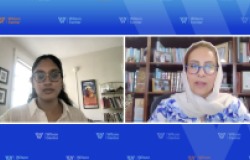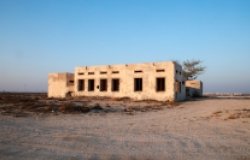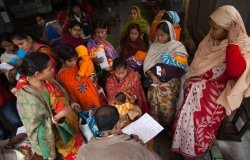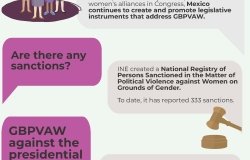Ruslana Iurchenko via Shutterstock
Curing Inequity: Opportunities for Improved Access to Women's Healthcare in Mexico
In honor of International Women's Day and Women's History Month, the Mexico Institute sought to review the state of women's access to healthcare in Mexico, examining recent trends, current conundrums, and upcoming opportunities. On March 28th, we convened a panel of subject matter experts to discuss how government, civil society, and private actors can come together to provide healing and promote hope.
Overview
Mexican women's access to healthcare has improved drastically over the past decades. Since the turn of the century, maternal mortality has decreased from 55 to 33 deaths per 100,000 live births and the percentage of people with access to at least basic sanitation services grew from 77 to 92. In a country where nearly two thirds of women work in the informal sector or are unemployed, Seguro Popular offered viable healthcare coverage for millions of Mexicans, including 66% of women and 88% of women in Mexico’s poorest quartile.
However, repealing the Seguro Popular in 2020 and replacing it with the National Health Institute for Wellbeing (INSABI) has created setbacks for women’s access to healthcare. The INSABI does not cover all conditions nor does it pay in full for chronic or severe illnesses or expensive prescriptions, placing 40-60% of the financial burden on patients. While it absorbed the Seguro Popular registry, it has failed to expand access to 16 million uninsured women. Compounding on these issues, the government shut down public daycares, subjecting mothers - who already experience discrimination in the workforce - to juggle childcare and work, steepening the relative cost of healthcare significantly.
Meanwhile, the COVID-19 pandemic has added another barrier to women’s healthcare access, curtailing family planning and sexual and reproductive health services, suspending treatments (including for cancer patients), and limiting the supply of essential medications. Pandemic-related lockdowns have also led to increases in domestic violence and adolescent pregnancies (in a country already holding the highest adolescent fertility rate) and placed a greater caretaker burden on women (who traditionally fill that household role).
To address the great nuance underlying women's access to healthcare in Mexico, we convened a panel of experts that addressed the current state of the problem, its differential impacts between rural and urban and indigenous communities, and the areas for improvement.
The discussion was held in Spanish with simultaneous translation to English. Encuentra la grabación en español aquí.
Speakers

Irene Tello Arista
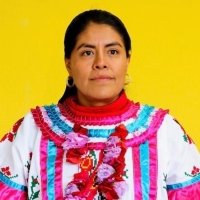
Eufrosina Cruz
Arantxa Colchero
Hosted By

Mexico Institute
The Mexico Institute seeks to improve understanding, communication, and cooperation between Mexico and the United States by promoting original research, encouraging public discussion, and proposing policy options for enhancing the bilateral relationship. A binational Advisory Board, chaired by Luis Téllez and Earl Anthony Wayne, oversees the work of the Mexico Institute. Read more

Maternal Health Initiative
Life and health are the most basic human rights, yet disparities between and within countries continue to grow. No single solution or institution can address the variety of health concerns the world faces. By leveraging, building on, and coordinating the Wilson Center’s strong regional and cross-cutting programming, the Maternal Health Initiative (MHI) promotes dialogue and understanding among practitioners, scholars, community leaders, and policymakers. Read more

Environmental Change and Security Program
The Environmental Change and Security Program (ECSP) explores the connections between environmental change, health, and population dynamics and their links to conflict, human insecurity, and foreign policy. Read more
Thank you for your interest in this event. Please send any feedback or questions to our Events staff.



